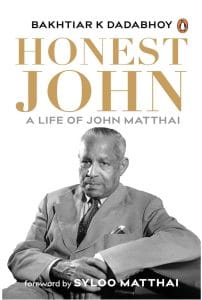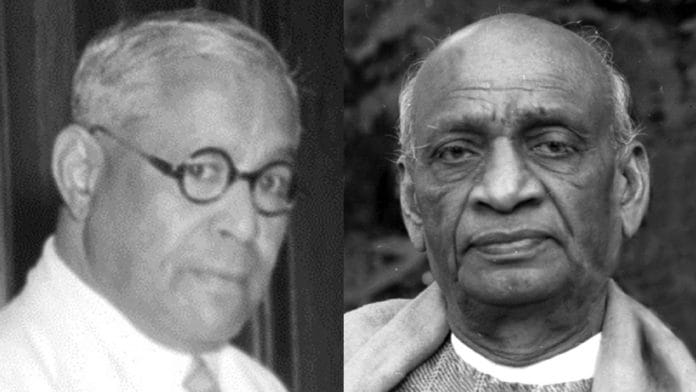On 23 July 1947, Nehru wrote to Matthai about the need for joint discussion on certain problems that had cropped up. More particularly, he wanted to know the solutions to a variety of problems facing the Railways. He said that the Hindu and Sikh workers in the railway workshop in Lahore were on the point of migrating to Delhi. He wanted them to be given some assurance and asked to remain where they were since ‘it is not entirely certain which way Lahore will go’. The problem of reorganizing the railways after Partition was also agitating Nehru’s mind.
A part of this system in the North-West and the North-East is cut off from India. What will happen to that part of the North-Western Railway which falls to the lot of India? So also in the east, there is the question of communication with Assam. It may be necessary to undertake some construction programme to connect Assam. We cannot do this on any big scale, but something on a small scale might be thought of.
Referring to a communique that was issued by Matthai about the consequences following Partition, Nehru said that a new administration had been planned for the parts of NWR which India was to maintain. He added that he had a horror of adding more and more high officers when the railway administration seems to have quite a large number of these people’. Apart from the costs involved, it would involve the retention of a large number of high British officers. ‘Even in the Health Department I feel shocked that there are far too many high officers doing precious little work. It is extraordinary how these people entrench themselves and create vested interests.’
Also read: When Ghadarites supported German ambition of invading India. Kashmir was key to their plan
Nehru also touched upon the structure of the railways. He said that if a new central administration was being planned in Delhi, then they would have to keep the accommodation problem in mind. You know how difficult it is to get houses in Delhi. Apart from accommodation, even the food situation here will be affected and prices are going up. Referring to the debate about the divisional system and the district system, he said that he had been given to understand that the divisional system was costly and top heavy and he hoped that Matthai would consider all these matters before final arrangements were made.
Earlier, in the second weck of June, Nehru had warned Matchai about the Hyderabad problem. Hyderabad was then flirting with the idea of Independence and Nehru wanted Matthai to be particularly vigilant. ‘This applies particularly to the Sholapur-Raichur and Bezwada-Nagpur sections. I hope you will keep this in mind,’ he said. Partition also entailed a large-scale redistribution of railway assets. Referring to the share of locomotives that were to go to Pakistan, Patel wrote to Matthai in early August 1947 adverting to the 121 locomotives destined for Pakistan, but which were still in Scaldah. He wanted them to be moved out before 15 August especially since it meant retention of some 1800 staff there, many of whom had opted to go to Pakistan. He stressed the safety aspect and wanted that the railways should before 15 August be completely manned by staff who had opted for India. In fact, the general manager of BAR had opted for Pakistan along with two other senior officials and Patel wanted immediate steps to be taken to effect the change.
The refugee problem was the most pressing and trying one the country was facing. An examination of the epistolary evidence suggests that there were some sharp exchanges between Matthai and Patel on the subject. All cabinet ministers were under great stress and tempers were often frayed. On 1 September, Patel wrote to Matthai that ‘the progress made in securing rail communication is slow and entirely out of keeping with the requirement’. He wanted quick decisions and immediate implementation of those decisions overcoming obstacles with will, the direction and the initiative’. He wanted a senior railway official with complete control over all railway resources to work alongside the military officer tasked with organizing the evacuation. He said that evacuation should have overriding priority and the railway official ‘should have almost a carte blanche’.
Patel’s letter elicited an immediate and an unexpectedly sharp response from Matthai. He said that the main bottleneck in running more trains was the lack of police and army protection. He said that it was a question of protecting the lives and property of passengers and since more trains could not be run without the requisite protection, Patel, as the minister concerned, should apply his mind to solving this problem. Stung by what he perceived to be a rebuke, Matthai said that it was not a question of ‘will, direction and initiative’ but of protecting the passengers. He was highly critical of Patel’s suggestion of a railway official with carte blanche. He said that the nation also faced an acute food, coal and salt crisis, all of which required transport just as urgently as the refugee problem. It was his duty as minister to ensure that these problems also got their share of transport and therefore in the present circumstances, he could not conceive of a more ill-considered suggestion.
Matthai seems to have taken Patel’s views on the failures of the railways to heart and a little personally. Clearly, he took offence.
I am sorry to write to you in this strain but your letter obviously calls for plain-speaking. We, as a Cabinet are faced with a crisis of unprecedented magnitude, and much to my regret I find a growing tendency among Ministers, when they find they are unable to discharge their own responsibilities, to place the blame on others. (Emphasis added.) It is only by consideration for one’s difficulties and a real willingness to render mutual co-operation that we shall survive this crisis.That even the normally serene Matthai could respond in such a manner shows how much pressure there was to perform, and just how frayed tempers were. In his reminiscences, V. Shankar of the ICS, who was private secretary to Patel, narrates his boss’s response to Matthai’s broadside. Patel gave Shankar the letter without saying a word. The Sardar had justly acquired the reputation of a man of few words, but even within that narrow compass, as Liaquat Ali Khan so pithily put it,’he meant what he said and said what he meant’.
Also read: How Nehru combated anti-India sentiment in West Asia—distanced himself from Israel
Whatever he said was always pregnant with wisdom and meaning. Though he was a lawyer by training, he was better known for his common sense, an attribute he seems to have been blessed with to an uncommon degree. This allowed him to reduce the most intricate and complex problems to remarkable simplicity.
Later, when Patel met Matthai, he said, You have obviously written it in a temper; I can be provoked into a temper and more easily than you but I shall say nothing because I know you will have to regret it yourself.’
Matthai listened to him gravely and said, ‘I am sorry but the complain you sent me was untrue and I felt that the whispers that go around affect
you as well. I find I was mistaken.’
There the matter ended. But Shankar says that true to Patel’s prophecy, ‘Matthai lived to own a complete reversal of his views’ of Patel and Nehru when he resigned as finance minister in 1950, a story that is told in some detail in a later chapter.
The change in fact was not long in coming: It was Matthai’s powerful support in favour
of the Hyderabad Police Action that enabled Patel to outvote Nehru.
 This excerpt from Bakhtiar K Dadabhoy’s ‘Honest John: A life of John Matthai’ has been published with permission from Penguin Random House India.
This excerpt from Bakhtiar K Dadabhoy’s ‘Honest John: A life of John Matthai’ has been published with permission from Penguin Random House India.







Who is Matchai?
When did John Mathhai become John Matthai? Before or after?
Who is to blame?
We are doomed.